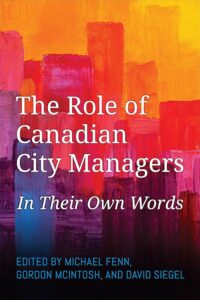Professional triumphs, adversities
The Role of Canadian City Managers: In Their Own Words
Edited by Michael Fenn, Gordon McIntosh, and David Siegel
Toronto: University of Toronto Press, 2023
$44.95 / 9781487552329
Reviewed by Ryan Mitchell
*

As a subtitle, “In Their Own Words” is literal: The Role of Canadian City Managers is penned by municipal administrators, former city councillors, and city managers across Canadian municipalities; they offer firsthand accounts and testimonials of their professional experiences. The volume primarily serves as a collection of think-pieces useful for aspiring city managers and a reflection for present practitioners. It may also illuminate the responsibilities and complexities of the career to the public and university students in planning, policy and public administration programs.
The introduction states the purpose of the book as aimed at providing practical advice to fill a gap in the literature which has traditionally been theoretical and aimed at academia. It commences with a brief coverage of the city manager profession in Canada, starting in the early 1900s. CMs (city managers), also known as CEOs (chief executive officers) or CAOs (chief administrative officers) in certain municipalities, function as a major conduit in the council-administration relationship.
The ‘council-city manager’ local governance structure was established in the US in the early 20th century to reform bureaucratic corruption and separate service delivery from politics. Under this system, the CM is the sole person at city hall directly accountable to council. They manage and coordinate municipal departments to ensure the council’s policy direction is carried out. City managers need to keep city council in check by not gravitating towards administrative functions, while working to prevent administrative staff from moving into overtly political matters. Essentially, CMs act as referees who ensure the city staff’s (municipal administration) function is to provide objective advice on bureaucratic matters. Council’s function, on the other hand, is to make decisions and form strategic policy based on input from the public.

City managers contrast with the ‘mayor-council’ style of municipal governance favoured by most larger cities in the United States. CMs are not elected positions but appointed by city council and the mayor. They often carry years, if not decades, of professional experience heading municipal departments, before being considered as qualified candidates for the role. CMs can help both staff/council keep communications and reports between each other concise and clear with relevant materials attached. CMs can also lead regular (e.g. quarterly) ‘check-ins’ between council and staff to ensure organizational performance is satisfactory.

The book’s chapters cover topics a typical city manager can be expected to face among their varied responsibilities. These include: career management advice, crisis management tools, dialoguing with First Nations communities, forming partnerships at each level of government, and practical team-building strategies. The books’ authors emphasize that city managers must first and foremost focus municipal strategy and prioritize goals for city staff. They must aid their city council in targeting a unified vision while also providing clear direction to city administration. City managers should work to direct the performance of the municipal organization to achieve results and maintain best practices.
Common threads throughout all the chapters are the authors’ descriptions of what comprises an effective city manager. For one, a CM is entrusted with forging strengthened political relationships among city staff and council. It is therefore imperative that CMs work to create a trusting environment between staff and council, notwithstanding political differences. CMs need to promote opportunities for success by trusting staff, and encourage constructive-criticism without the fear of reprisal. They must be able to lead difficult but essential conversations about strategic direction, policy choices, and organizational challenges in a productive manner.

The book is also unique in that it provides first-person accounts from a socially and ethnically diverse group of professionals, including several chapters penned by women who openly share their lived experiences in a changing professional environment. Some remark candidly on the professional adversities they’ve faced in their careers for supposedly being inexperienced or ‘unsuitable’ for the job due to its traditional male-dominance. Several chapters in the book serve to clarify the relationship between CM and mayoral duties, as both positions are often conflated in the public eye. Many CMs reserve the opinion that mayors, while unquestionably important to the nature of municipal government, yield a largely symbolic authority. It is argued that CMs should consider the nature of this relationship as a ‘co-leadership opportunity,’ especially in larger cities where CMs tend to have less power than in small communities.
The book is primarily notable for having practitioners in the field author the chapters themselves, instead of having a single (or group of) academics/theorists describing the city manager profession on their behalf. Some of the chapters present more professional advice while some are more opinionated, yet all are valuable for balancing objective descriptions of the functions of the role with more subjective commentary. The Role of Canadian City Managers offers an insider’s look into a little-known (or clearly understood) profession for the average person, and anyone interested in the functioning of Canadian municipal governance, or political science in general would find particularly insightful.
*

Ryan Mitchell is an avid reader and part-time editor passionate about people’s stories, history, film, and cities. His background is in sociology and urban studies, and he enjoys volunteering with local cycling initiatives, film, and street festivals. In recent years, he gained experience as an editor for a UN-sponsored NGO called AlterContacts: Lockdown Economy, archiving small-business experiences facing the challenges of the pandemic. An Ontarian now based in Vancouver, Ryan enjoys exploring the rainy coast of BC and the Pacific Northwest and is working to become a city planner. [Editor’s note: Ryan Mitchell has previously reviewed books by Perry Bulwer, Mary Soderstrom and Tamar Glouberman.]
*
The British Columbia Review
Interim Editors, 2023-25: Trevor Marc Hughes (non-fiction), Brett Josef Grubisic (fiction and poetry)
Publisher: Richard Mackie
Formerly The Ormsby Review, The British Columbia Review is an online book review and journal service for BC writers and readers. The Advisory Board now consists of Jean Barman, Wade Davis, Robin Fisher, Barry Gough, Hugh Johnston, Kathy Mezei, Patricia Roy, Maria Tippett, and Graeme Wynn. Provincial Government Patron (since September 2018): Creative BC. Honorary Patron: Yosef Wosk. Scholarly Patron: SFU Graduate Liberal Studies. The British Columbia Review was founded in 2016 by Richard Mackie and Alan Twigg.
“Only connect.” – E.M. Forster